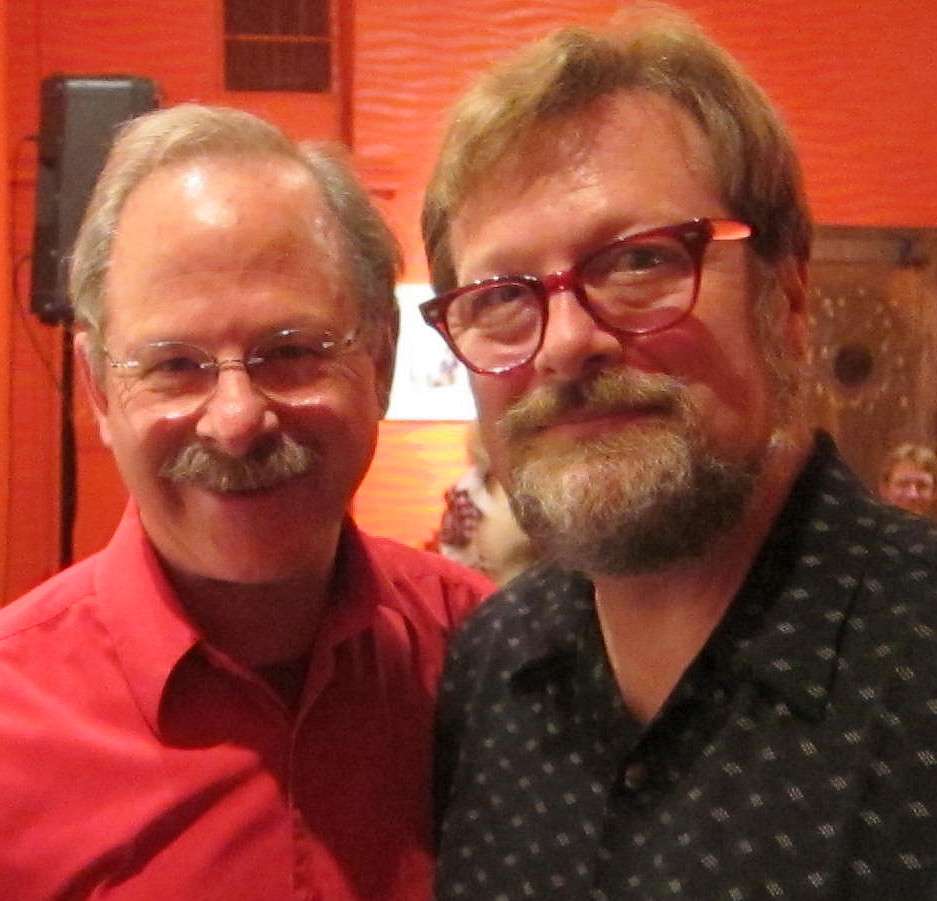|
Back
And The Deaf Shall Be Resurrected New York
Contagious Sounds Series: Gershwin Hotel, 7 East 27th Street (at right angles to the Sex Museum)
11/30/2011 -
Neil Rolnick: Scenes from MONO (Words by Neil Rolnick, Barbara Blatner, Larry Kagan)
Mellissa Hughes (Soprano), Dafna Naphtali (Mezzo-soprano), Nick Hallett (Tenor), Robert Osborne (Bass)
Kelli Kathman (Flute), Alicia Lee (Bass clarinet), Vicky Chow (Keyboard), Yuki Numata (Violin), Caleb Burhaus (Viola/Tambourine), Clarice Jensen (Cello), Todd Reynolds (Music Director/Conductor/Laptop/Monome), Neil Rolnick (Voice and Laptop), Luke DuBois (Video), Jody Elff (Sound)

N. Rolnick, T. Reynolds (© Coco T. Dawg)
Gabriel Fauré pouted about the “terrible cloak” when going deaf, and never wrote another note. Bedrich Smetana imitated the ringing in his deafened ears in a string quartet. As for Beethoven...well, his final chamber music came from his inner ear. Almost 200 years later, they are still puzzling and irrational, equally tragic and cosmic.
When composer Neil Rolnick discovered that his left ear was losing hearing suddenly and quickly, he also discovered that the auditory science of his particular problem has been little more developed than that of Beethoven’s time. But this Texan-born composer neither capitulated to his Alamo or became obsessed with its symptoms. His compositions having frequently seized upon biographical and geographical experiences, this deafness was the accelerator for a series of not depressing meditations.
For a solo prologue, Mr. Rolnick’s computer became an instrument of reverberation, imitation (audible and inaudible), toneful chants to his verbal exegeses about the history and the present situation. This, though was but an introduction to six extended “scenes”, sung, played, flashed on a background wall to words created by the composer and his friends.
The chamber orchestra could have come from a Pierrot Lunaire movement–string quartet, bass clarinet, flute and one or two keyboards. To this was added a quartet of excellent singers, all conducted by Todd Reynolds. The results could have been either maudlin or cute or both.
But Mr. Rolnick has shown himself to be master contrapuntist–i.e., a composer who can take the simplest music and wind it around in the most intricate circles long before we realize we’re inside his web. Add to that, the lyrics he worked with had the sense of irony and tragedy which could have an eccentric sense of beauty.
In the final “scene”, Rocket Eye, tenor Nick Hallett sings of being hit in the eye by a stray explosive in Israel. And as a sculptor (“I have always been a sculptor,” he begins), the rocket eye could destroy him.
But now, musically and lyrically, Mr. Hallett sings (with the other three bouncing and augmenting the melody) that his ping-pong game is better, that he can teach drawing better, and that finally he refuses to have his eye healed.
This sounds almost gruesome, but Mr. Rolnick’s music, going from the plaintive to tango to cheery fugues, makes perfect sense of this loss of a sense.
In another strange story, Mr. Rolnick speaks of trying to rehearse a piece for the Chinese New Music Festival. A habitual traveler to the Far East and Central Europe, this should be easy. But with only one ear, he details the problems in balance, in attempting to do the impossible.
The narrative is almost sad, but the music straightens this out. Mr. Reynolds switched from conductor to playing the Monome, an electronic controller with the most microscopic tone changes, Mr. Rolnick works with is computer, and both orchestra and choral quartet join in. The result is like a diary, set to music which gives the diary its own artistic setting.
For the Numb scene, words are chanted, spoken and sung with the orchestra:
“It’s hard to notice things you don’t notice. Patches of tactile sense loss don’t leave obvious holes in your field of information like visual blind spots would. They mostly just feel weird.”
But these same words are scrolled on the wall, sometimes in large print, sometimes small, all hand-written. The result is like the reverberations in the malformed ear. Sounds coming in and out, echoing and...well, lost.
The other scenes of MONO enjoy the same precision of line, the same almost naive melodies which are taken up by solo singers and orchestra, augmenting (or sometimes playing opposite feelings) to the words. To their credit, Messrs Rolnick and Reynolds rounded up some of New York’s best soloists in the orchestra. On the other hand, these young players, all stalwarts of the fine contemporary music ensembles in New York, must have enjoyed performing a work which is not only original and challenging, but which transforms a grotesque situation into enigma, paradox and poisslby almost liberation.
Harry Rolnick
|